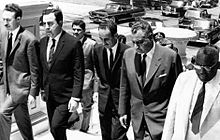Ismail al-Azhari
Ismail al-Azhari (Arabic: إسماعيل الأزهري, romanized: ʼIsmāʻīl al-Azharī; October 20, 1900 – August 26, 1969) was a Sudanese nationalist and political figure.Al-Azhari and other educated Sudanese demanded greater participation in the administration of the country, and to promote their objectives they formed the Graduates' General Congress in 1938.Between 1944 and 1953 al-Azhari, as the leading advocate for uniting the Sudan with Egypt, fought tenaciously against any act which appeared to weaken the "unity of the Nile Valley".It soon became clear that the Sudanese people did not want to be tied closely to Egypt, and in his greatest act of statesmanship al-Azhari dramatically reversed the position which he had long advocated and, with the support of the principal political leaders, declared Sudan independent on January 1, 1956.The third problem which confronted al-Azhari's government was the uniting of the black, non-Muslim southern Sudanese with peoples and traditions very different if not opposed to the Arab, Muslim north.More importantly, the fragile alliance between the Khatmiyya sect and the NUP began to disintegrate, leaving the prime minister without the popular support he needed to rule effectively.As a result, he reformed his coalition into a "government of all talents" in February 1956, but then his former Khatmiyya supporters deserted to form the People's Democratic Party in June.Al-Azhari sought to regain power, but without a strong political base even his skill as a politician was insufficient to lead a government in Sudan.

Chairman of the Sovereignty CouncilSovereignty CouncilSirr Al-Khatim Al-KhalifaGaafar NimeiryPrime Minister of SudanElizabeth IIKnox HelmAbd al-Rahman al-MahdiAbdallah KhalilOmdurmanAnglo-Egyptian SudanKhartoumDemocratic Unionist PartyArabicromanizedSudanesepolitical figureHead of State of SudanMay 1969 coupCooper prisonWad MadaniGordon CollegeAtbaraAmerican University of BeirutGraduates ConferenceAllal al-FassiAziz Ali al-MisriKhatmiyyaUmma PartyNile ValleyEgyptian Revolution of 1952King Farouk IMuhammad NaguibGamal Abdel NasserNational Unionist PartyHouari BoumedièneAlgeriaNurredin al-AtassiAbdul Salam ArifBritish parliamentary form of governmentMuslimmutinyEquatoria CorpsPeople's Democratic PartyAbdullah KhalilIbrahim AbboudPresident of Sudanmilitary coup d'état led by Col. Gaafar NimeiryHistory of Sudan (1956–1969)Faber and FaberPresidents of SudanRepublic of SudanAbboudAl-KhalifaDemocratic Republic of SudanNimeirySwar al-Dahabal-Mirghanial-BashirRevolutionary Command Council for National SalvationTransitional periodIbn Aufal-BurhanTransitional Military CouncilTransitional Sovereignty CouncilPrime ministers of SudanKhalilMahgoubal-MahdiAwadallaDaf'allahMoussaHamdokHussein